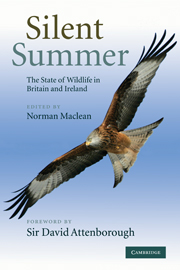Book contents
- Frontmatter
- Contents
- List of contributors
- Foreword
- Preface
- Acknowledgements
- List of abbreviations
- 1 Introduction
- PART I FACTORS DRIVING CHANGES IN WILDLIFE
- 2 Climate change
- 3 Agriculture, woodland and semi-natural habitats
- 4 Vertebrate animal introductions
- 5 Plant introductions
- 6 Urbanisation and development
- 7 The Great Game: the interaction of field sports and conservation in Britain from the 1950s to 2008
- 8 Going fishing: recent trends in recreational angling
- 9 Impacts of hormone-disrupting chemicals on wildlife
- 10 Water pollution: other aspects
- 11 Twenty-five key questions in ecology
- PART II CONSERVATION IN ACTION
- PART III THE CASE HISTORIES
- Glossary
- Name index
- Subject index
- Plate section
- References
11 - Twenty-five key questions in ecology
Published online by Cambridge University Press: 05 August 2012
- Frontmatter
- Contents
- List of contributors
- Foreword
- Preface
- Acknowledgements
- List of abbreviations
- 1 Introduction
- PART I FACTORS DRIVING CHANGES IN WILDLIFE
- 2 Climate change
- 3 Agriculture, woodland and semi-natural habitats
- 4 Vertebrate animal introductions
- 5 Plant introductions
- 6 Urbanisation and development
- 7 The Great Game: the interaction of field sports and conservation in Britain from the 1950s to 2008
- 8 Going fishing: recent trends in recreational angling
- 9 Impacts of hormone-disrupting chemicals on wildlife
- 10 Water pollution: other aspects
- 11 Twenty-five key questions in ecology
- PART II CONSERVATION IN ACTION
- PART III THE CASE HISTORIES
- Glossary
- Name index
- Subject index
- Plate section
- References
Summary
Summary
This chapter is slanted very much towards a section of our expected readership, namely students of ecology and environmental science. I should also acknowledge help from my co-authors over formulating this chapter, especially Rob Robinson, the author of our bird chapter (Chapter 17).
In 2005, a workshop was organised in the UK for which 654 people from government and research centres with a specific interest in ecology were invited to draw up a list of questions to which policy-makers in UK ecology most urgently needed answers. One thousand and three questions were initially generated and discussed by the workshop participants. At a further two-day workshop this list was refined, initially to 188 questions and then finally to 100 questions.This final shortlisting was done by the ‘policy’ people, but not the ‘academics’ at the meeting. This was then published in the Journal of Applied Ecology in 2006 (see Sutherland et al. 2006). I have now further reduced the initial list of 100 to a list of 25. Of necessity, some significant questions are left out, but I have tried, wherever possible, to merge numbers of questions into one over-arching question. The questions are not placed in any rank order of importance, but are grouped roughly into topic areas.
A subsequent paper in the same journal (Sutherland et al. 2008) uses the technique of horizon scanning to identify new potential ‘threats and opportunities facing UK biodiversity’ and this is discussed later in this chapter. […]
- Type
- Chapter
- Information
- Silent SummerThe State of Wildlife in Britain and Ireland, pp. 156 - 164Publisher: Cambridge University PressPrint publication year: 2010
References
- 1
- Cited by



